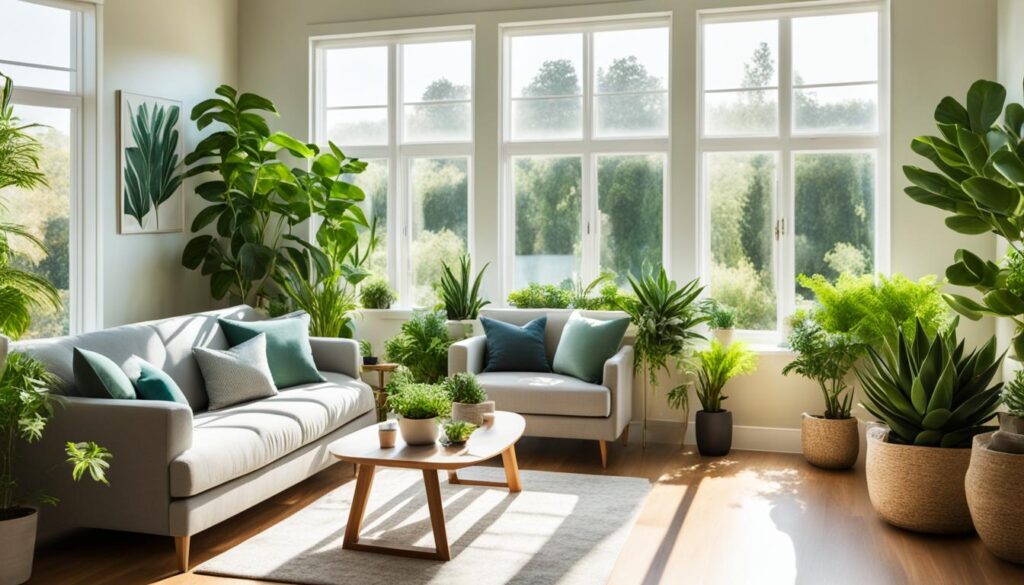Welcome to our blog where we explore the fascinating world of indoor plant decor. Did you know that incorporating indoor plants into your home can do wonders for your health and happiness? It’s true! Scientific studies have shown that indoor plants have a multitude of benefits, from improving air quality to enhancing cognitive function and reducing stress and anxiety. So, get ready to discover the secrets of greenery and how it can transform your indoor space into a haven of well-being and tranquility.
Key Takeaways:
- Indoor plants improve air quality by reducing pollutants and toxins.
- Being around indoor plants can enhance cognitive function and improve memory and attention.
- Indoor plants have a calming effect and can reduce stress and anxiety.
- Caring for indoor plants brings a sense of fulfillment and joy.
- Indoor plants promote happiness, contentment, and overall mental health.
The Benefits of Indoor Plants on Air Quality
Indoor plants are not only an aesthetically pleasing addition to our homes but also play a crucial role in improving air quality. Through the process of photosynthesis, indoor plants absorb carbon dioxide and release oxygen, effectively replenishing the air we breathe.
However, their air-purifying capabilities extend beyond oxygen production. Indoor plants have the remarkable ability to remove harmful toxins and pollutants from the air, creating a healthier indoor environment for us to thrive in.
One of the primary toxins that indoor plants can eliminate is formaldehyde, a common chemical found in household products and building materials. Exposure to formaldehyde can cause respiratory issues, eye irritation, and allergic reactions. By having indoor plants, we can effectively reduce formaldehyde levels and mitigate these health risks.
Benzene is another harmful compound that indoor plants can combat. It is commonly found in chemical-based cleaning agents, paints, and plastics. High levels of benzene in the air can lead to dizziness, headaches, and even long-term health consequences. Incorporating indoor plants into our living spaces helps to filter out benzene, promoting cleaner and fresher air.
Trichloroethylene, often found in solvents and synthetic fibers, is yet another pollutant that indoor plants can effectively target. Prolonged exposure to trichloroethylene can cause respiratory issues, dizziness, and fatigue. By having indoor plants, we can significantly reduce trichloroethylene levels and improve the quality of the air we breathe.
The combined effect of these air-purifying capabilities makes indoor plants a natural and effective solution for reducing indoor pollutants and toxins. By incorporating a variety of indoor plants into our homes, we can enhance air quality, promoting better respiratory health and overall well-being.
Whether you choose leafy greens such as Boston fern or spider plant, or flowering varieties like peace lilies or snake plant, these indoor plants have the remarkable ability to improve air quality and create a healthier living space. They not only enhance the visual appeal of our homes but also contribute to our physical and mental well-being.
Enhancing Cognitive Function with Indoor Plants
Research has shown that incorporating indoor plants into our living and working spaces can have a positive impact on cognitive function. These green companions not only beautify our environment but also provide significant benefits to our brain health.
Indoor plants play a vital role in improving air quality by releasing oxygen and removing harmful pollutants from the air. This increase in oxygen levels has a direct impact on brain function, enhancing memory retention, attention spans, and problem-solving abilities.
“Indoor plants have been found to improve cognitive tasks, such as attention, memory, and productivity.” – University of Exeter
The presence of indoor plants promotes stress reduction and improved mood, creating a calm and conducive atmosphere for enhanced cognitive performance. The connection with nature offered by indoor plants has been shown to boost creativity, further contributing to increased productivity.
By nurturing a green environment indoors, we can create a harmonious space that stimulates our cognitive abilities and improves overall well-being. Let’s explore some of the specific ways in which indoor plants enhance cognitive function:
Improved Memory
The increased oxygen supply provided by indoor plants promotes brain health and improves memory. Studies have shown that individuals working or studying in environments with indoor plants demonstrate better memory retention and recall compared to those in plant-free spaces.
Enhanced Attention
Indoor plants help improve attention span and concentration. The presence of plants in our surroundings creates a visually pleasing and calming environment, reducing mental fatigue often associated with long periods of work or study. This enhanced focus leads to improved attention and higher productivity.
Increased Productivity
By reducing stress levels and promoting a positive mood, indoor plants contribute to higher productivity. The soothing and natural environment created by plants helps create a sense of calm, allowing individuals to work more efficiently and effectively.
The benefits of indoor plants on cognitive function are undeniable. By incorporating green elements into our indoor spaces, we can enhance memory, attention, and productivity, leading to improved cognitive performance in various areas of our lives.
| Benefits | Description |
|---|---|
| Improved Memory | Enhances memory retention and recall |
| Enhanced Attention | Improves focus and attention span |
| Increased Productivity | Promotes higher productivity and efficiency |
Reducing Stress and Anxiety with Indoor Plants
Indoor plants have a remarkable ability to soothe and calm, making them powerful allies in reducing stress and anxiety. Spending time in the presence of plants can have a profound impact on our well-being, promoting relaxation, improving mood, and creating a sense of inner peace. The natural beauty and vitality of indoor plants instill a sense of harmony and tranquility, making them ideal companions for those seeking respite from the hectic demands of daily life.
Did you know that being around indoor plants can actually reduce cortisol levels? Cortisol is a stress hormone that can wreak havoc on our mental and physical health when produced in excess. By spending time with indoor plants, we can experience a decrease in cortisol levels, promoting a more relaxed state of being.
“The presence of indoor plants can have a profound impact on our mental well-being. Their calming effect promotes relaxation, reduces anxiety, and provides a sanctuary from the stressors of daily life.” – Dr. Olivia Green, Indoor Plant Therapy Expert
Indoor plants also have the remarkable ability to create a sense of well-being and happiness. The vibrant green colors and gentle foliage of plants evoke feelings of vitality and connection with nature. This connection to the natural world has been shown to have immense therapeutic benefits, reducing stress and anxiety and improving overall mental health.
Promoting a Healthy Mind and Body
Research has shown that being surrounded by indoor plants can have a positive impact on our physical and mental well-being. Studies have revealed that patients in hospital rooms adorned with plants experienced reduced stress levels, lower blood pressure, and faster recovery times compared to those in rooms without foliage.
- Indoor plants promote relaxation and calmness.
- They reduce anxiety levels and create a serene environment.
- The presence of indoor plants can lower blood pressure.
- Plants improve air quality, providing fresh oxygen for better breathing.
Creating a Stress-Free Haven
Adding indoor plants to your home or workspace can transform it into a stress-free haven. Whether it’s a lush green fern in the corner of your living room or a colorful orchid on your desk, these plants bring positive energy and a sense of tranquility. Their presence serves as a gentle reminder to slow down, take a deep breath, and reconnect with nature.
Incorporating indoor plants into your daily routine can be as simple as spending a few minutes each day tending to their needs. Watering, pruning, and caring for your plants provides a mindful activity that helps you focus on the present moment, letting go of stress and embracing a sense of calm.
The Power of Greenery
The use of indoor plants as natural stress relievers has gained significant recognition in recent years. The therapeutic benefits of greenery have made their way into homes, offices, and even healthcare facilities. The serenity and beauty of indoor plants offer a sense of refuge from the noise and chaos of modern life, promoting well-being and enhancing mental health.
- Indoor plants reduce stress by creating a calming environment.
- They decrease cortisol levels, a stress hormone responsible for anxiety and tension.
- The presence of plants improves mental well-being and promotes a sense of tranquility.
Nurturing indoor plants not only beautifies your space but also nurtures your mind and soul. These green companions provide a natural remedy for stress and anxiety, contributing to overall well-being and a more balanced life.
Cultivating a Sense of Fulfillment and Joy with Indoor Plants
Caring for indoor plants can bring a profound sense of fulfillment and joy. The act of nurturing plants provides a rewarding experience and enhances mental well-being.
Proper plant care techniques, such as watering, pruning, and propagation, can further enhance the sense of fulfillment. Sharing plant cuttings with others fosters a sense of community and connection. By cultivating indoor plants, we can experience increased happiness, contentment, and a deeper connection with nature.
When we commit to the care and growth of indoor plants, we develop a unique bond with nature. The process of watching a plant grow and thrive under our care instills a sense of accomplishment and satisfaction. As we witness new shoots and blossoms, we realize the impact we have on the well-being of these living organisms.
Plant care also provides an opportunity to practice mindfulness. Engaging in the nurturing process, whether it’s checking the soil moisture, removing dead leaves, or providing a suitable environment, encourages us to be present in the moment. This mindful connection with our plants can bring a deep sense of satisfaction and fulfillment.
The Joy of Propagation: Sharing and Growing Together
One of the joys of cultivating indoor plants is the ability to propagate and share their beauty with others. Propagation, the process of creating new plants from existing ones, not only helps expand your indoor plant collection but also fosters a sense of community and connection.
By sharing plant cuttings with friends, family, or fellow plant enthusiasts, you not only spread the joy of indoor gardening but also create a sense of belonging. The act of exchanging plant cuttings carries a spirit of generosity and nurtures relationships. Watching the shared cuttings take root and grow into thriving plants is incredibly gratifying.
“Sharing plants with others creates a sense of community and connection. It’s a beautiful way to spread the joy and fulfillment that indoor plants bring.” – [Author Name]
The Beauty of Diverse Plant Care Rituals
Each indoor plant requires unique care, giving us an opportunity to explore various plant care rituals. From the frequency of watering to the type of fertilizer used, understanding and catering to the specific needs of different plants can be a fulfilling and educational journey.
Exploring different plant care techniques and observing how your plants respond can be both exciting and rewarding. As you learn and adapt your care routines, you become more attuned to the needs of your plants, deepening your connection and sense of fulfillment.
Benefits of Cultivating Indoor Plants
| Benefits | Description |
|---|---|
| Fulfillment | Caring for indoor plants brings a profound sense of fulfillment and accomplishment |
| Joy | The act of nurturing plants promotes happiness and contentment |
| Connection | Sharing plant cuttings fosters a sense of community and connection |
| Mindfulness | Plant care encourages mindfulness and being present in the moment |
| Learning | Exploring different plant care rituals provides a valuable learning experience |
The Fulfillment of Greenery
The presence of indoor plants fills our spaces with beauty and vibrancy. Their colors, textures, and lush foliage bring life into our homes and workplaces. Surrounding ourselves with greenery taps into our innate connection with nature, creating a sense of fulfillment and joy that can uplift our spirits.
Promoting Happiness and Contentment with Indoor Plants
Indoor plants have the incredible ability to bring happiness and contentment into our lives. Their presence creates a serene and calming environment that instantly uplifts our mood and promotes a sense of tranquility and peace. Whether it’s a vibrant green foliage or a burst of colorful flowers, these plants have a way of brightening up our living spaces and bringing us joy.
The act of caring for indoor plants also contributes to our overall happiness and well-being. The process of nurturing and tending to these plants gives us a sense of accomplishment and purpose. Taking the time to water, prune, and care for our plant babies allows us to connect with nature in a meaningful way and experience the joy of watching them thrive.
Not only do indoor plants provide aesthetic beauty and fulfillment, but they also have a significant impact on our mental health. Numerous studies have shown that being surrounded by plants can reduce stress, anxiety, and symptoms of depression. The natural elements and soothing presence of indoor plants create a positive atmosphere that supports our mental well-being.
“Nature always wears the colors of the spirit.” – Ralph Waldo Emerson
The healing power of nature is well-documented, and indoor plants offer us a way to experience this healing within the comfort of our own homes. They purify the air, increase oxygen levels, and release phytoncides that have a calming effect on our minds and bodies. The connection with nature that indoor plants provide allows us to find solace and contentment in the midst of our busy lives.
| Benefits | Description |
|---|---|
| Stress Reduction | Indoor plants have a calming effect on our nervous system, reducing stress levels and promoting relaxation. |
| Anxiety Relief | Being in the presence of indoor plants can alleviate anxiety, providing a sense of calm and serenity. |
| Mood Enhancement | The vibrant colors and natural beauty of indoor plants have a positive impact on our mood, lifting our spirits and promoting a sense of happiness. |
| Connection with Nature | Indoor plants allow us to bring a piece of the natural world into our homes, fostering a deeper connection with nature and promoting well-being. |
By incorporating indoor plants into our living spaces, we can create an environment that supports our mental health and well-being. The simple act of surrounding ourselves with greenery and taking care of these plants can have a profound impact on our happiness and contentment. So, let’s embrace the beauty of indoor plants and let them bring us joy, fulfillment, and a sense of peace every day.
Conclusion
In conclusion, incorporating indoor plant decor into our homes has a significant impact on our overall well-being. The benefits are far-reaching, from improving air quality to enhancing cognitive function, reducing stress and anxiety, and cultivating a sense of fulfillment and joy. Indoor plants are truly nature’s secret to happiness.
Indoor plants play a vital role in improving the air quality inside our homes. They act as natural air purifiers, removing pollutants and toxins, and releasing fresh oxygen. By creating a healthier indoor environment, indoor plants contribute to our physical health and overall well-being.
Moreover, spending time in the presence of indoor plants can have a positive effect on our mental health. They help reduce stress and anxiety, promoting a sense of relaxation and calm. Taking care of indoor plants can also bring a deep sense of fulfillment and joy, as we witness their growth and nurture them as living beings.
By incorporating indoor plants into our homes, we not only add a touch of natural beauty but also create a harmonious and happy atmosphere. The presence of indoor plants promotes a sense of tranquility and happiness, contributing to our overall wellness. So, let nature’s secret to happiness flourish indoors with indoor plant decor.
Frequently Asked Questions
Decode the magic of gardens with our guide to Landscaping Styles Frequently Asked Questions.
- Indoor plants absorb carbon dioxide and release oxygen through photosynthesis, improving air quality. They also have the ability to remove toxins such as formaldehyde and benzene from the air, contributing to better respiratory health.
- Indoor plants increase oxygen levels through photosynthesis, which improves air quality and brain function. This leads to enhanced memory retention, attention spans, problem-solving abilities, and creativity.
- Yes, spending time in the presence of indoor plants can promote relaxation, reduce cortisol levels, and improve mood. Indoor plants create a sense of well-being and happiness, contributing to reduced stress and anxiety.
- The act of nurturing indoor plants provides a rewarding experience and enhances mental well-being. Proper care techniques such as watering and pruning can further enhance the sense of fulfillment. Sharing plant cuttings with others fosters a sense of community and connection.
Recent Posts
- Modern Mural Ideas Transforming Walls into Artworks
- Thematic Table Decor Dressing Your Table for Special Occasions
- Festive Lighting Ideas Brightening Your Home for the Holidays
- Biodegradable Decor Materials Choosing Earth-Friendly Options
- Personalized Space Decor Making Your Home Uniquely Yours
- New Year’s Eve Decor Ringing in the New Year in Style
- Transforming Junk into Decor Upcycling at Its Best
- Second-Life Decor Objects Giving Old Items New Purpose
- Unique Decoration Crafting Standout Ideas for Your Home
- Environmentally Friendly Styling Decor with a Conscience











